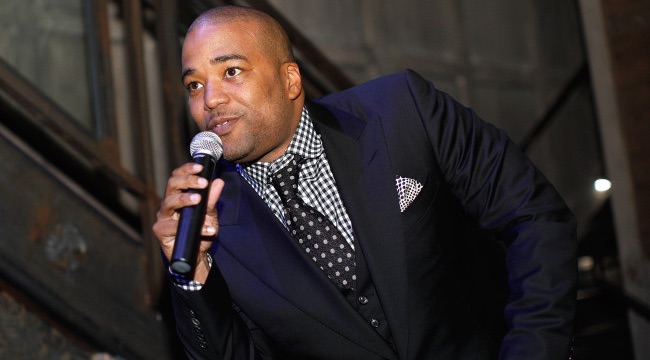
When Chris Lighty died of an apparent suicide in 2012, a void was created in his wake. There are no books dedicated to his memory, no exhaustive volumes of articles and most importantly, a giant piece of a hip-hop story left untold. Thanks to Reggie Ossé, aka Combat Jack the tales and legacy of the man affectionately known as Baby Chris are coming back to life.
Mogul: The Life & Death Of Chris Lighty, a six-episode serialized podcast from Ossé and Christopher Morrow chronicles the rise and tragic fall of one of hip-hop’s more prominent executives. The show airs exclusively through Spotify as a partnership between Ossé & Morrow’s Loud Speakers Network collective and Gimlet Media. From A Tribe Called Quest to 50 Cent and Violator, Lighty was instrumental in pushing the boundaries of what hip-hop looked like, what it felt and still feels like. It also doubles as a chronicle to the rise of hip-hop itself as Lighty, a Bronx born kid utilized his surroundings and the emerging culture around him to find his own voice and way.
Ossé is no stranger to the podcasting world; he’s spent the previous seven years as host of The Combat Jack Show, one of the earliest hip-hop podcasts before the podcast boom truly took off. Lighty’s story to him is a personal one and Mogul: The Life & Death Of Chris Lighty is a project that combines two audiences: Jack’s affectionate back and forth and piquing interview style from The Combat Jack Show and the narrative-driven world beloved by fans of Serial and This American Life.
“There are very few of us that made it through almost every era of hip-hop and made an impact,” Ossè told NPR about what brought him to starting Mogul. “When we set out to do this story, we didn’t set out to solve the mystery. We didn’t set out to be Serial. We wanted to tell his story.”
Through a collection of interviews with friends, family and former clients, Mogul discusses Lighty’s rise through the management ranks with A Tribe Called Quest and more. In episode 3, Warren G chimes in on how Lighty practically saved Def Jam Records in the mid-1990s when brokered the deal that resulted in the “Regulate” rapper signing to the label.
About Lighty, Ossè noted that he didn’t have a direct rapport with him as he came up. Rather, he admired his work from afar. “He was somebody [I recognized] from day one, even before I was in the industry, when I was in college at Georgetown Law and hearing the Jungle Brothers mention “Baby Chris,” or seeing him in some of the videos [like] “Buddy” with Native Tongues,” Ossè told NPR. “I was like, yo, he’s not a member of any of these groups but why does it seem like he’s the glue between all of this? So, in a sense, I was a fan that became a colleague.”
One of the main pillars about the series is its discussions of mental health. Though advocating for therapy is becoming more and more of a beacon in the black community, it was shunned and ignored for a long period of times. As Lighty’s work became more appreciated, stress and other factors began to creep in more frequently. Even though he had a saying of “stay in your lane and master your craft,” Lighty, like many of us was breaking on the inside.
Ultimately what Mogul achieves is a bit of closure and validation. As the first serialized hip-hop podcast, it won’t be long before other important figures with intriguing back stories such as Master P or Puff Daddy join the fray. For Ossè, it was all about honoring Lighty and representing the culture the right way.
“I wouldn’t be surprised if, after this story, so many people and companies jump into this space,” he said. “And I would say to everyone in our culture, when that check comes, when that opportunity comes to tell the next story, don’t forget that you’re still in command of making sure you tell the story right.”






